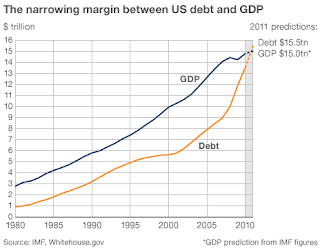The day the US debt was downgraded
5th August 2011 is a historic day when ratings agency Standard and Poors downgraded the US public debt from AAA to AA+ for the first time in modern history.
S&P downgrade explanation
S&P took this decision to reflect the lack of leadership from US politicians to tackle urgently and decisively the mounting US public debt, which may exceed GDP soon as seen on the chart below.
S&P downgrade explanation
S&P took this decision to reflect the lack of leadership from US politicians to tackle urgently and decisively the mounting US public debt, which may exceed GDP soon as seen on the chart below.
The debate frontier is now between the "spenders" like Paul Krugman - who think the US can recover from the crisis through more public spending which will lead to economic growth necessary to repay debt in the future - and the "deficit hawks" - who highlight that excessive debt raises the risk of a catastrophic default and therefore debt should be reduced urgently. The first view prevailed when a stimulus package was decided on the onset of the recession. The downgrade by S&P, which reflects the increasing riskiness of the US debt, goes in the direction of the second view by showing that the benefits of the stimulus package (preventing a sharper recession in the short term) were outweighted by the longer term risks of excessive debt burden. According to US economist Kenneth Rogoff (whose book I found very useful in understanding the current crisis), the reason why such an inadequate policy tool has been chosen is that a lot of economists failed to notice that financial crisis have different characteristics from other types of recession and therefore require different answers. He suggests to allow moderate inflation (4 to 6% annual) in order to reduce the debt burden smoothly. However inflation itself is also a destabilizing factor, because once it quicks off it becomes extremely difficult to control and that's why all Central Bankers are staunchly opposed to it. In my view, in the case of the United States of America, they still have an important tool at their disposal to curb deficits: increase taxes. The case of the United Kingdom is in this respect a "school case" of making tough choices - increasing tax, reduce drastically public spending - to trade short-term pain (low growth and social tensions for a few years) for long-term benefits (reduce deficit and start again from a healthier economic and fiscal situation). Markets have reacted very positively to this news with yields on UK 10 year bonds as low as 2.66% (source: Bloomberg, 8/08/2011) and I believe that the UK will emerge from this crisis stronger. In the case of Euro-zone countries, the situation is more difficult because they don't control their currency and therefore their inflation rate and it is difficult to see how a single policy actor (the European Central Bank) can find an appropriate response to countries that are in very disperse fiscal and economic situations.



Comments
Post a Comment